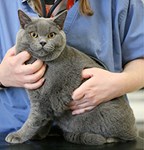First ever systematic review and meta-analysis of adverse effect of antiepileptic drugs in canine epilepsy
How safe are antiepieleptic drugs? RVC research sheds light on epilepsy treatments.
Researchers from Royal Veterinary College (RVC) have found that the effectiveness of testing anti-epileptic drugs’ (AEDs) safety and tolerability for canine epilepsy has been below the expected standard. Only in recent years the quality of studies carried out can be considered adequate.

The RVC’s canine epilepsy clinic has carried out the first ever systematic review and meta-analysis on the tolerability and safety of all AEDs in canine epilepsy. The aim of the study was to assess the adverse effect profile of each individual AED by analysing all available data that has been published for each specific AED and then evaluating how reliable the data was. The study was published in BMC Veterinary Research (DOI: 10.1186/s12917-016-0703-y).
To do this the researchers gathered, screened and assessed all the information published in peer-reviewed journals and publications. The individual studies were then evaluated based on the quality of evidence, study design, study group sizes, subject enrolment quality and overall risk of bias. The results now provide a new and more objective insight into the tolerability and safety of the AEDs.
Co-author of the study, Marios Charalambous, said: “"We recruited systematic and statistical methods to combine, compare and summarize the results of independent studies and, therefore, create more objective and reliable conclusions based on the current evidence. It was a time-consuming, demanding and challenging process, but we are sure that we provide the clinicians now with essential information which they can use for daily practice".
By reviewing, assessing and untangling the vast amounts of data, the researchers found that much of the evidence for the medical treatment of canine epilepsy was based on subpar reporting of adverse effect and in studies that were below the expected standard.
Professor Holger Volk, Clinical Director of the RVC Small Animal Referral Hospital and Professor of Veterinary Neurology and Neurosurgery, said: “Not only does this study offer a new perspective on the management of canine epilepsy, but also highlights the importance of the need for trials which provide high quality evidence in order to have more reliable and objective results about the safety and tolerability of the AEDs in veterinary medicine.”
Dr. Dave Brodbelt, Senior Lecturer in Companion Animal Epidemiology, added: “This is a valuable addition to the body of literature on canine epilepsy, highlighting safety issues and adverse events related to its management and adding further depth to the evidence base relevant to practicing vets”.
Epilepsy is the most common chronic neurological condition found in dogs and humans. It affects around 50,000 canines in the UK and approximately 600,000 people. Epilepsy is not a specific disease but a chronic condition characterised by recurrent seizures.
The most common treatment for canine epilepsy is AEDs, making this study extremely important in relation to the management of the condition.
This study highlights further that to improve the level of testing for the drug treatments of canine epilepsy it is recommended that veterinary scientists and stakeholders work together. Professor Volk has been chairing the international veterinary epilepsy task force (IVETF), where an international body of 26 vets and scientists have come together to set out unified and standardised guidelines for the research, diagnosis and treatment of canine and feline epilepsy. IVETF was set up in 2014 by a group of Veterinary Neurology Specialists and non-specialists. It is an independent organisation and its main aim is to provide the veterinary community, breeders and pet owners with key advice on the key areas in the field of epilepsy. The IVETF consensus statements can be found as an article collection in BMC Veterinary Research.
Press Office Contact
Uche Graves / Zoe White
T: 0800 368 9520
E: uche.graves@plmr.co.uk / zoe.white@plmr.co.uk
Notes to Editors
The Royal Veterinary College (RVC) is the UK's largest and longest established independent veterinary school and is a constituent College of the University of London. The RVC offers undergraduate, postgraduate and CPD programmes in veterinary medicine, veterinary nursing and biological sciences, being ranked in the top 10 universities nationally for biosciences degrees. It is currently the only veterinary school in the world to hold full accreditation from AVMA, EAEVE, RCVS and AVBC.
A research-led institution, in the most recent Research Excellence Framework (REF2014) the RVC maintained its position as the top HEFCE funded veterinary focused research institution.
The RVC also provides animal owners and the veterinary profession with access to expert veterinary care and advice through its teaching hospitals; the Beaumont Sainsbury Animal Hospital in central London, the Queen Mother Hospital for Animals (Europe's largest small animal referral centre), the Equine Referral Hospital, and the Farm Animal Clinical Centre located at the Hertfordshire campus.
RVC Press Release 24 May 2016
See other Press Releases.
You may also be interested in:
-
Research shows why vets are often missing the cause of feline diabetes
Royal Veterinary College research, published in the journal PLOS ONE, reveals that 1 in 4 cases of …

